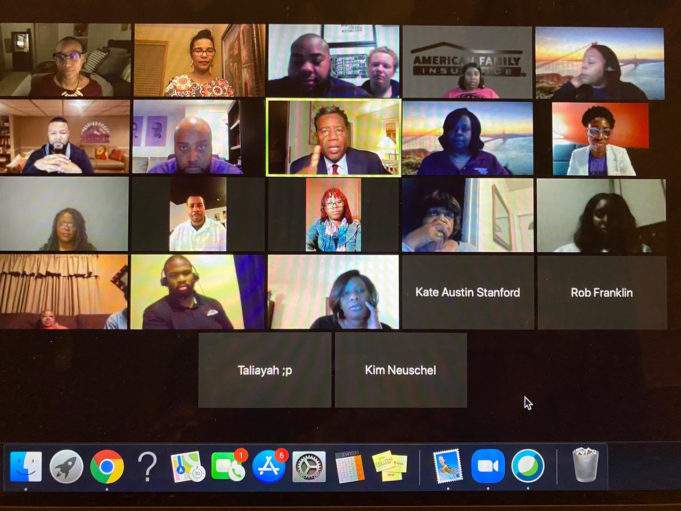Through a tumultuous year, the 2020 graduates of the Justified Anger Leadership Institute put their skills into practice — before they even graduated.
The original 15 participants were scheduled to graduate in May from the eight-month program that is designed to prepare and connect African-American leaders in Madison. Instead, the pandemic disrupted the in-person curriculum completely and graduates used their leadership skills to advocate for a delayed but extended program.
Lead faculty Annette Miller, who has been part of the program since 2017, said this year proved to be more useful to graduates than ever.
“One of the things that I felt the students did a great job of is really leaning into the edginess of what change means when you’re thinking about leadership – you have to adapt, you have to adjust and I felt like they did a really good job of advocating for themselves and talking about what they needed and wanted in order to complete the program,” Miller told Madison365.
Participants usually attended monthly in-person sessions from 8:30 a.m. to 4 p.m. that are meant to be networking, mentoring and learning opportunities. The more than 60 hours of in-class time touches on topics such as the history of leaders and leadership, leading vs. managing, professional development and how to manage microaggressions. This year graduates were able to participate in some of those sessions, but not all.
Traditionally, a capstone community project to address a community issue finishes off the program. But not this year as the pandemic not only ended in-person opportunities but students’ ability to participate suffered as personal and professional commitments arose, Miller said.
When students were scheduled to graduate in May, they said they were not ready.
Instead, students came to the JALI leadership team and advocated for two more half-day sessions to discuss topics like health, self-care and liberation. Speakers Kaleem Caire and M Adams guided some of those sessions. The graduation ceremony was held in October.
“The graduation was representative of how proud they were despite having this really disruptive life situation happen,” Miller said. “It was less about speakers and more about how do we exert our leadership in a moment of change? And how do we advocate for what we want? And how do we ask a system, which in this case was the leadership institute to adapt and ensure that they get what they needed? So we feel like our work was really manifested through their voice and advocacy to push on us to deliver the type of content that they were looking for.”
Sharon Rice, a quality improvement specialist at Group Health Cooperative who took the program for the first time, said she walked away from the class feeling empowered.
She has had opportunities to participate in other leadership groups– but she felt more comfortable with the JALI because there were people who looked like her, and people she could relate to. Rice described the group as a supportive and welcoming environment.
“It became my sanctuary,” she said. “Where I could go and be me.”
She said she learned how to bring her voice forward in a predominately white environment, where she often felt unheard.
“I also really learned what I need internally, what I need for myself,” she said. “I learned how to protect myself and learned that I am just as important as the next person. When you are already dealing with insecurities and you go into a space where you are the only brown person in the room that makes it even harder for you to deal with your insecurities.
“They gave me the strength and helped me realize the power that I didn’t know I had.”
And although not all of the 15 participants who started the program could attend the graduation in October, Miller said it was memorable.
“We tell people that everyone is a leader,” she said. “This isn’t about positional power, this is about individual power. And so we need people to understand that they all have the ability to lead. They don’t need a position as a way to demonstrate their leadership.”
Justified Anger’s Leadership Institute is recruiting for its fifth cohort now. The program is expected to start in January. Applications can be found at nehemiah.org.










